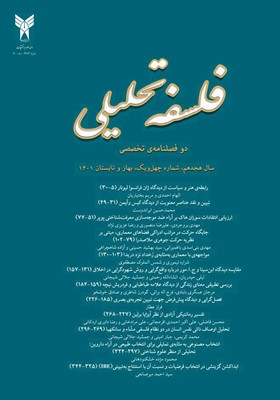مقایسه دیدگاه ابنسینا و ج.ا.مور درباره واقعگرایی و روش شهودگرایی در اخلاق
محورهای موضوعی : فلسفه
لیلی حیدریان
1
,
انشاءالله رحمتی
2
*
,
جمشید جلالی شیجانی
3
![]()
1 -
2 -
3 -
کلید واژه: واقعگرایی, شهودگرایی, مشهورات, ابنسینا, مور,
چکیده مقاله :
در این نوشتار آراء ابنسینا و جرج ادوارد مور در زمینهی اخلاق واقعگرا و ضمن بحث دربارهی روش شهودگرایی در تشخیص خاصههای اخلاقی تبیین و مقایسه میشود. واقعگرایی در اخلاق به معنای عینیت پذیری گزارههای اخلاقی است و از این رو خاصههای اخلاقی شهود پذیرند. مسئلهی اصلی تحقیق صورتبندی آراء ابنسینا ضمنِ اصول واقعگرایی و روش شهودگرایی است، اینکه آیا گزارههای اخلاقی ذیل آراء مشهوره از همان اصولی تبعیت میکنند که مور آنها را در مبحث واقعگرایی در اخلاق مطرح کرده است و اینکه چگونه میتوان آنها را شهود کرد. واقعگرایی اخلاقی نزد مور بر اساس شهودگرایی خاصههای اخلاقی نظیر خوب و بد است، اموری که غیرقابل تحویل به امور طبیعی یا مابعدالطبیعی است. نزد ابنسینا واقعگرایی اخلاقی بر اساس نفس الامری بودن محمولهای اخلاقی نظیر حسن و قبیح تعریف و قابل شهود میشود. در این نگرش حسن و قبیح برای نفس، به عنوان موجودی که اعتلا و سعادت آن امری واقعی است، تبیین شده است. نتایج این تحقیق نشان میدهد که نزد مور ارتباط میان موضوعات اخلاقی و محمولهایی نظیر خوب و بد امری شهودی است که آنرا ارتباط خوب با بیشترین خیر ممکن تعریف کرده است و این تلازم و درک آن مستلزم تأمل و بلوغ عقلی فاعل اخلاقی است. نزد ابنسینا ارتباط میان موضوعات اخلاقی و محمولهای اخلاقی نظیر حسن و قبیح بر اساس شهرت گزارههای اخلاقی و شهود عقلاء قوم تبیین شده است.
This article explains and compares the views of Ibn Sina and G.E. Moore in the field of realist ethics and while discussing the method of intuition in recognizing moral characteristics. Realism in ethics means the objectivity of moral propositions, and therefore moral properties are intuitive. The main issue of research on the formulation of Ibn Sina's views, along with the principles of realism and the method of intuition, is whether the moral propositions under popular opinion follow the same principles that Moore put forward in the discussion of realism in ethics and how they can be intuitive. Moore's moral realism is based on the intuitionism of moral qualities such as good and evil, which are unacceptable to the natural or metaphysical. According to Ibn Sina, moral realism is defined and intuitive based on the moral presuppositions such as good and bad. In this attitude, the good and the bad for the soul are explained as a being whose exaltation and happiness is a real thing. The results of this study show that for Moore, the relationship between moral issues and predicates such as good and bad is an intuitive thing, which is defined as a good relationship with the greatest possible good, and this combination and understanding requires reflection and intellectual maturity of the moral agent. According to Ibn Sina, the relationship between moral issues and moral presuppositions such as good and bad is explained on the basis of the reputation of moral propositions and the intuitions of the wise of the people.
_||_

